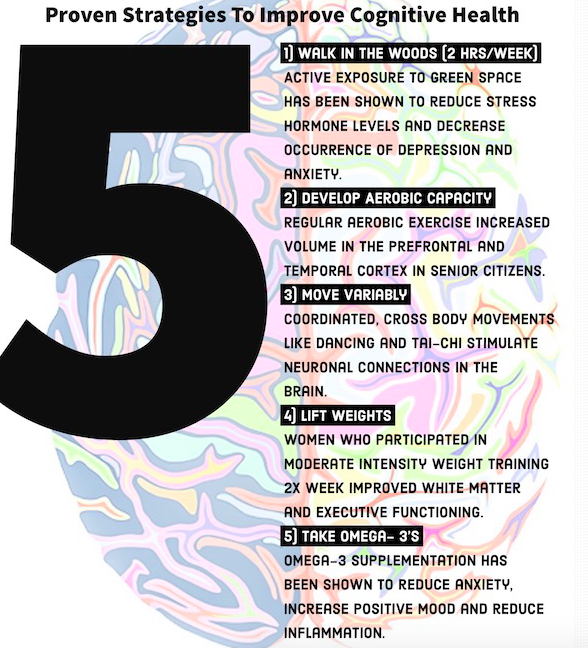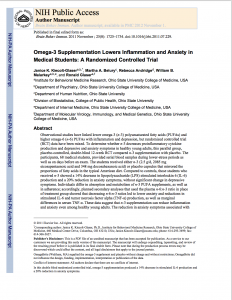
Written in conjunction with StrengthCoach Ep. 304
Spending time in nature has been proven to be an effective strategy to improve psychological health. Multiple studies have demonstrated that a time spent walking outdoors can significantly reduce negative emotions such as anger, hostility, and tension while improving positive emotions like vigor when assessed on the Profile of Mood States and State-Trait Anxiety Inventory.
Additionally, we have also seen the effect that exposure to greenspace can have on numerous physiological indicators of stress. In separate studies of city-bound men and women, researchers discovered that walking in the woods for 2 hours a day over the 3 days significantly increased Natural Killer cell production and activity while also simultaneously reducing sympathetic stress hormones adrenaline and noradrenaline. Natural Killer cells are a vital component of our immune system whose function is to kill tumors and virus-infected cells.
What’s most exciting about this study is that NK Cell production and activity did not only respond acutely to forest exposure but stayed chronically elevated for 30 days following the subject’s last hiking experience
An observational study of over 300,000 patients in the Netherlands found that there was a significant correlation between living near green space and frequency of numerous diseases and overall morbidity
The most significant reduction was seen when looking at the frequency of depression and anxiety, giving hope that nature exposure could be an effective part of treatment for stress-related disorders.
Want to work to improve how your immune system deals with stress and anxiety? Try adding in a couple hours of walking in the woods per week. Stumped for places where you can get outside? Try out the AllTrails app for free for thousands of outdoor opportunities around you.
https://itunes.apple.com/us/app/alltrails-hike-run-cycle/id405075943?mt=8
Want to check out the supporting research? Click on the screenshots below.
Aerobic exercise has been shown to increase volume in the prefrontal and temporal cortex, the two regions that are often reported to show substantial age-related deterioration.
The Temporal lobes are associated with effective long-term memory function, losses in these areas of the cortex have been associated with Alzheimer’s disease.
The Prefrontal cortex is associated with critical cognitive process ranging from inhibitory functioning to measures of general intelligence.
The gains in brain mass are believed to be a result of acute increases in blood flow and brain-derived neurotrophic growth factor (BDNF) spurring the growth of new capillary beds, creating an atmosphere for neurogenesis in the brain. Additional studies have also demonstrated that amateur aerobic athletes who take a 10-day cessation from training have significant reductions in chronic blood flow in the hippocampus. The hippocampus is often the region of the brain most impaired with cognitive decline during Dementia and Alzheimer’s disease.
How can you incorporate more aerobic training into your life?
The first thing you can do is make sure that you are training with a heart rate monitor so that you can effectively track your intensity. I highly recommend using the MyZone system that we utilize at Mike Boyle Strength and Conditioning. https://myzone.org
Once you can track your heart rate I would recommend doing for steady-state cardiac output work and interval training to develop aerobic health.
Cardiac Output can be developed by maintaining a heart rate at 60-70% of your max for 30-90 minutes using brisk walking, running or cycling.
Interval training work can be used to develop aerobic power and it often best done on a dual action bike like an Airdyne or Assault bike. First, perform a Modified Coopers test on the bike to determine your maximum aerobic speed. Then use the data obtained in the test to prescribe the correct interval intensity on the protocol shown below.
Modified Coopers Test on Bike: https://www.youtube.com/watch?v=jmTpfHucIU0
How To Do Maximum Aerobic Speed Intervals: https://strengthcoachblog.com/2014/01/22/maximum-aerobic-speed-intervals/
Want to check out the supporting research? Click on the screenshots below.
Numerous studies have demonstrated both dancing and tai-chi to be effective interventions for improving cognitive health in aging populations, independent of improvements in aerobic health. The key in these activities seems to be the involvement of coordinated, cross-body movements that stimulate the production of neurotrophins and help develop new connections between the two hemispheres of the brain.
Brains that decline with old age often do so due to disuse, not simply because they slow down. The key seems to be in creating an environment where the brain continues to be challenged to learn and adapt. Full-body, choreographed movements that occur in dancing and tai-chi require conscious learning and rehearsal, lighting up multiple regions of the and brain demanding that the neural networks continue to re-wire and stay active.
Although the research has only been done on dancing and tai-chi there is no reason to believe that these results cannot be reproduced using other integrated, full-body drills. Carla Hannaford, Neurophysiologist and author of “Smart Moves” strongly recommends the use of crawling patterns.
“When crawling movements are done slowly, it requires fine motor involvement and balance, consciously activating the vestibular system and frontal lobes.”
“When done on a regular basis more nerve cells and networks form and myelinate in the corpus callosum, thus making communication between the two hemispheres faster and more integrated for high-level reasoning”
A great way to incorporate more variable movements into your workout is by adding in movements like skipping, crawling, ladder, drills, and other multiplanar dynamic movements into your warm-ups. For some ideas, check out the two video below.
Want to check out the supporting research? Click on the screenshots below.
Resistance training has also shown promise to help maintain and even improve our cognitive health as we age. Resistance training done for twice per week for one hour was shown to improve executive function, reduce white matter atrophy and improve memory in women over 65 years old. Knowing the benefits resistance training can have on walking speed and functional independence for senior citizens as they age the evidence on cognitive health reinforces how important it is to lift weights later in life.
The impact resistance training has on cognitive health is believed to be a result of improved blood flow, upregulation of BDNF as well as Insulin-Like Growth Factor (IGF) which is able to pass through the blood-brain barrier and provided neuroprotective benefits. Authors also hypothesize that resistance training may help participants reduce chronic inflammation and manage blood glucose, further providing protective benefits to the brain.
Want to begin incorporating more strength training into your life?
Here are three options to get you started:
1). Look for a certified professional in your area to help you get started. I would recommend using our “Find A CFSC Map” to locate a qualified coach.
http://www.certifiedfsc.com/locations
2). Would you prefer distance coaching to in-person coaching?
We offer online coaching through Movement As Medicine.
Send an e-mail to kevin@movement-as-medicine.com to find out more.
3). Just need some help putting together a basic program?
Check out some of our recommended resources:
Want to check out the supporting research? Click on the screenshots below.
Supplementation of Omega-3 fish oils has shown promise in reducing chronic inflammation and psychological symptoms of anxiety, depression and aggression. Research has demonstrated that supplementation can significantly reduce circulating levels of C-Reactive Protein, Interleukin-6 and TNF Alpha all of which are markers of chronic inflammation. Given how chronic inflammation can affect cognitive abilities an effort is being made to look at how these anti-inflammatory benefits can have a direct impact on the outward behaviors in children and young adults.
In a randomized, controlled, double-blind study that examined the effect of 6 months of 200mg/day of Omega-3 supplementation researchers found that it reduced outward aggressive behavior in children ages 8-16 when compared to a placebo.
In research examining the benefits of omega-3 supplementation for anxiety and inflammation in high-stress medical students, researchers found it to be effective at lowering chronic stress marker IL-6 and TNF while also reducing symptoms of anxiety.
Given how widespread of an impact depression has on modern society, researchers are now looking at how the anti-inflammatory benefits of fish oil could benefit those suffering from depressive disorders. We know that patients with major depressive disorders routinely have lower levels of Omega-3 and the societies who regularly consume high levels of Omega-3 polyunsaturated fats have a lower prevalence of major depressive disorders.
When studying the relationship between Omega-3 consumption and prevention of Interferon-A induced depression researchers found that supplementing 700 mg of EPA (eicosapentaenoic acid) for two weeks significantly reduced and prevented the common depression experienced in patients undergoing Interferon therapy.
While research is still being done on the mechanisms behind the positive benefits that Omega-3’s have on behavior it is known that Long-chain fatty acids make up a large percentage of the cell membrane and are critical to regulating brain function and neuron regeneration.
Want to add more Omega-s’s into your diet? Fresh, wild caught salmon, herring and sardines are all rich sources of Omega-3’s.
Can’t stomach fish? Try supplementing 2,000-4,000 mg/day with a quality, well-sourced brand of fish oil like Civic Nutrition.
https://www.civicnutrition.com
Want to check out the supporting research? Click on the screenshots below.

ARE YOU CERTIFIED YET?
Our Certified Functional Strength Coach Level 1 Online Course is designed to provide you with the same experience you’d get attending our live Level 1 workshop. Complete with the same pre-workshop materials, our Online Course includes a ‘Virtual Live Workshop’, where you will follow a CFSC instructor through an entire Level 1 Workshop complete with instruction, demonstration and question and answer as if you were spending the day at Mike Boyle Strength and Conditioning. Keeping with our rigorous practical standards, all enrollees will be required to complete an online exam and a coaching practical featuring video and open ended questions to complete their certification.